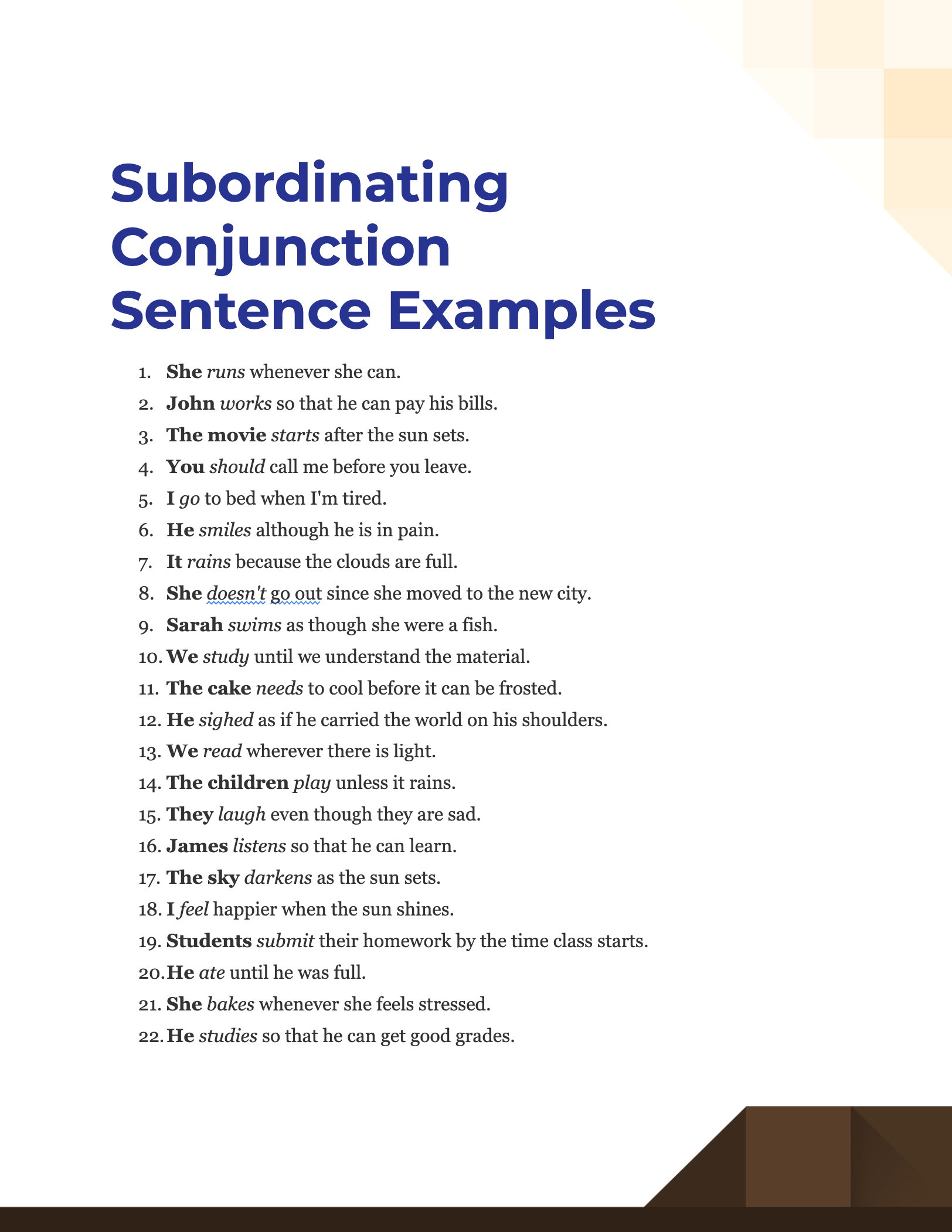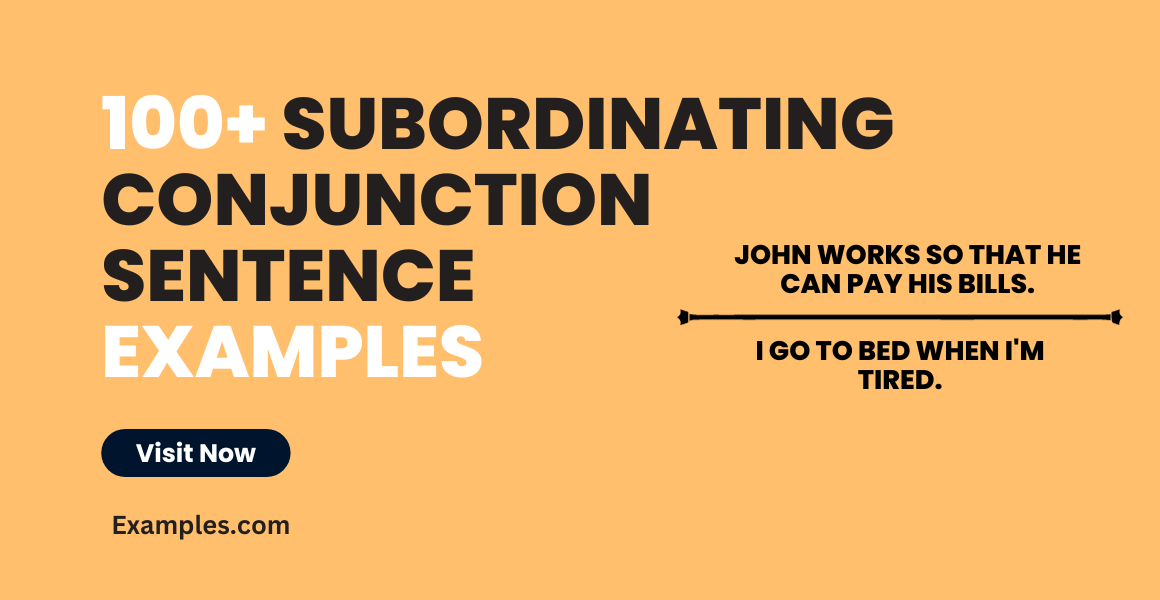99+ Subordinating Conjunction Examples
Delve into the intricate world of subordinating conjunctions and how they can dramatically improve your sentence structures. By mastering subordinating conjunctions, you can create complex, engaging, and more informative sentences. From sentence examples to how-to guides and expert tips, this article is your go-to resource for all things related to subordinating conjunctions in sentences.
What is a Subordinating Conjunctions Sentence? – Definition
A subordinating conjunctions sentence is a complex sentence that consists of an independent clause and one or more dependent clauses introduced by subordinating conjunctions such as ‘although,’ ‘because,’ ‘since,’ and ‘while.’ These conjunctions serve to provide additional information, contrast, or clarification to the main clause.
What is the Best Example of a Subordinating Conjunctions Sentence?
The sentence “Although it rained, we still had a great time at the picnic” serves as an exemplary instance of a subordinating conjunctions sentence. In this example, “Although it rained” is the dependent clause, and “we still had a great time at the picnic” is the independent clause. The subordinating conjunction ‘although’ introduces the dependent clause, adding depth and context to the overall statement.
100 Subordinating Conjunctions Sentence Examples

Are you eager to craft more complex and meaningful sentences? Understanding how to properly use subordinating conjunctions can be a game-changer for you. Here, we offer a selection of 100 diverse examples featuring subordinating conjunctions in action. Each sentence has the subject bolded and the verb italicized for easier comprehension.
- She runs whenever she can.
- John works so that he can pay his bills.
- The movie starts after the sun sets.
- You should call me before you leave.
- I go to bed when I’m tired.
- He smiles although he is in pain.
- It rains because the clouds are full.
- She doesn’t go out since she moved to the new city.
- Sarah swims as though she were a fish.
- We study until we understand the material.
- The cake needs to cool before it can be frosted.
- He sighed as if he carried the world on his shoulders.
- We read wherever there is light.
- The children play unless it rains.
- They laugh even though they are sad.
- James listens so that he can learn.
- The sky darkens as the sun sets.
- I feel happier when the sun shines.
- Students submit their homework by the time class starts.
- He ate until he was full.
- She bakes whenever she feels stressed.
- He studies so that he can get good grades.
- The cat hides whenever it hears a loud noise.
- The team celebrates after they win a game.
- The flowers bloom once the spring arrives.
- They will move if they find a better place.
- I sleep because I need to recharge.
- It is crucial that you follow the instructions.
- The concert begins as soon as the lights dim.
- She listens to music while she works.
- The project fails unless everyone contributes.
- I am happier when I’m with you.
- She is kind, although she can be stern.
- Tom jumps as if he were on a trampoline.
- The snow melts whenever the sun comes out.
- They drive until they reach the destination.
- I draw whenever I find the time.
- He is healthy because he exercises.
- She reads before she goes to bed.
- We eat as soon as we get home.
- The students talk while the teacher writes.
- He helps whenever someone is in need.
- You must take notes during the lecture.
- The cake rises as it bakes.
- They practice so that they can improve.
- She rests after she finishes her work.
- He knows where he is going.
- We watch the stars whenever the sky is clear.
- She smiles although she is tired.
- The dog barks if it sees a stranger.
- You can go as long as you promise to be careful.
- He doesn’t eat meat, even though he used to.
- The company thrives because it innovates.
- The sun sets as the moon rises.
- She attends the meetings whenever she is in town.
- We will order food if you’re hungry.
- They will listen provided you make sense.
- I feel better when I exercise.
- She writes as if she’s talking to you.
- The car needs fuel before we go.
- I will travel where the road takes me.
- The alarm rings until you turn it off.
- He paints as though he’s been doing it for years.
- They will attend the concert, assuming they get tickets.
- She visits her parents whenever she can.
- The baby cries unless he’s fed.
- They won’t proceed until they have permission.
- She bakes after she finishes her chores.
- I run even if it’s raining.
- He will call as soon as he lands.
- She takes the bus when her car is in the shop.
- The teacher explains until everyone understands.
- They move although they love this house.
- I will stay if you need me.
- He swims so that he can stay fit.
- You should go before it gets dark.
- They enjoy hiking whenever the weather is nice.
- I am relaxed because I meditated.
- You must leave when the bell rings.
- They will succeed provided they work hard.
- The dog waits until its owner comes home.
- He sings whenever he’s in the shower.
- They won’t pay unless they get good service.
- She studies while her baby sleeps.
- We will proceed as long as everyone agrees.
- The fans cheer although their team is losing.
- He won’t drive if he’s tired.
- I work better when there is less noise.
- She reads so that she can learn.
- They listen even when they don’t agree.
- You should call as soon as you arrive.
- The child eats before he plays.
- She practices piano whenever she has free time.
- I will go wherever you go.
- The teacher adapts his lessons, depending on the students.
- They discuss politics although they often disagree.
- He will join the party if he’s invited.
- The movie starts when the lights dim.
- I run every morning, unless it’s raining.
- She will graduate provided she passes all her exams.
How do you use subordinating in a sentence?
Subordinating conjunctions serve as the linking words that join an independent clause and a dependent clause. By using a subordinating conjunction, you can add depth, contrast, or cause-and-effect relationships to your sentences. Here is how to use subordinating conjunctions in a sentence:
- Identify the Main Clause: This is the independent clause that can stand alone as a sentence. Example: “I enjoy walking.”
- Identify the Dependent Clause: This is the part of the sentence that can’t stand alone but provides additional information. Example: “when the weather is nice.”
- Insert the Subordinating Conjunction: Place the subordinating conjunction at the beginning of the dependent clause.
- Combine the Clauses: Join the independent and dependent clauses together.Final Sentence: “I enjoy walking when the weather is nice.”
Pro Tips:
- If the dependent clause is at the beginning of the sentence, use a comma after it.
- Use different subordinating conjunctions to add variety and clarity to your writing.
Is a subordinating conjunction a simple sentence?
No, a sentence with a subordinating conjunction is generally not a simple sentence. A simple sentence contains only one independent clause and no dependent clauses. On the other hand, a sentence that uses a subordinating conjunction includes both an independent and a dependent clause, thus making it a complex sentence.
For example:
- Simple Sentence: “I read books.”
- Complex Sentence: “I read books while I am on the bus.”
In the second sentence, “while I am on the bus” is a dependent clause introduced by the subordinating conjunction “while.” It can’t stand alone as a sentence, which is why the sentence is categorized as complex, not simple.
Understanding the role of subordinating conjunctions can greatly improve the complexity and fluidity of your writing, enabling you to express a wider range of ideas and relationships between those ideas.
How do you write Subordinating Conjunctions Sentences? – Step by Step Guide
Writing sentences with subordinating conjunctions can elevate your language skills by providing a way to express more complicated ideas and relationships. Here’s a step-by-step guide to crafting compelling sentences with subordinating conjunctions:
- Identify Your Main Point: First, understand the core message you wish to convey. This will typically be in the form of an independent clause that can stand alone.
- Example: “The project succeeded.”
- Decide What Needs Elaboration: Think about aspects of your main point that require additional information or clarification.
- Example: The reason for the project’s success.
- Choose the Right Conjunction: Depending on what you wish to elaborate, select an appropriate subordinating conjunction like “because,” “although,” “when,” etc.
- Example: “because”
- Form a Dependent Clause: Create a dependent clause that provides the extra information.
- Example: “the team worked hard.”
- Combine the Clauses: Now, put the independent and dependent clauses together, inserting the subordinating conjunction where it fits best.
- Example: “The project succeeded because the team worked hard.”
- Review and Revise: Always re-read your sentence to ensure that it is grammatically correct and that the meaning is clear.
- Add Punctuation if Needed: If your dependent clause comes first, separate it from the independent clause with a comma.
- Example: “Because the team worked hard, the project succeeded.”
- Test for Clarity: Finally, read the sentence aloud to make sure it communicates your point effectively.
By following these steps, you can produce well-structured, informative, and complex sentences that capture your audience’s attention.
Tips for Using Subordinating Conjunctions Sentences
- Vary Your Conjunctions: Repeating the same conjunctions can make your writing monotonous. Diversify your choices to keep the reader engaged.
- Positioning Matters: While it’s common to place the dependent clause after the independent one, you can also start the sentence with the dependent clause for emphasis or variety. Just remember to use a comma to separate the clauses.
- Be Clear and Precise: Ensure that the relationship between the clauses is clear. Misusing conjunctions can lead to confusing sentences.
- Balance Length: Avoid making your dependent clause too long or complex, as it might overshadow the main point.
- Check for Fragments: Make sure every sentence has at least one independent clause. A dependent clause by itself is a fragment and is considered a grammatical error.
- Use Them Sparingly: While subordinating conjunctions can add depth to your writing, overuse can make your text hard to follow.
- Know Your Conjunctions: Some conjunctions like ‘although,’ ‘unless,’ and ‘since,’ have specific meanings and conditions for use. Make sure you understand these before including them in your sentences.
Mastering the use of subordinating conjunctions allows you to write more complex, informative, and engaging sentences. Happy writing!



